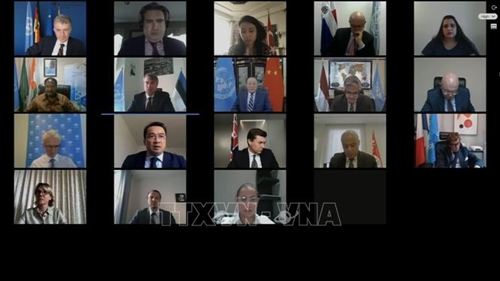Anh made the statement during a U.N. Security Council (UNSC) video conference on the situation in Syria on September 16.
    |
 |
|
At the UNSC video conference on the situation in Syria on September 16 |
He reiterated the necessity to ensure continuous and unobstructed deliveries of humanitarian aid to all areas in Syria, saying concerned parties must strengthen cooperation and maintain a security environment conducive to the passage of humanitarian supplies.
The ambassador also called on the international community to further ramp up support for Syria, with the main focus placed on response to the COVID-19 pandemic, to not worsen the situation in the Middle Eastern country.
In his remarks, U.N. Under-Secretary-General for Humanitarian Affairs and Emergency Relief Coordinator, Mark Lowcock, said Syria has 3,618 confirmed cases of coronavirus but the actual number may be much higher due to limited testing.
“We will not be able to grasp the extent of the outbreak until laboratory testing is increased across the country,” Lowcock said. “We do know that community transmission is widespread, as almost 90 percent of newly-confirmed cases cannot be traced to a known source. Infection rates among health workers have also been rising.”
Syria lacked the health workers it needed even before the pandemic, he said, adding that supply shortages and temporary shutdowns add even more pressure to its decimated health system.
The World Health Organization (WHO) has been coordinating COVID-19-related relief efforts in Syria. It has worked to expand the country’s testing capacity and provision of personal protective equipment and medical supplies.
Meanwhile, the U.N. has been making extra efforts to provide access to humanitarian aid, mainly food, to about 7.4 million Syrians each month.
Syria has entered its 10th year of instability and conflict, creating one of the most serious humanitarian crises in history, with hundreds of thousands of people dead or injured and millions of others losing their homes.
Source: VNA